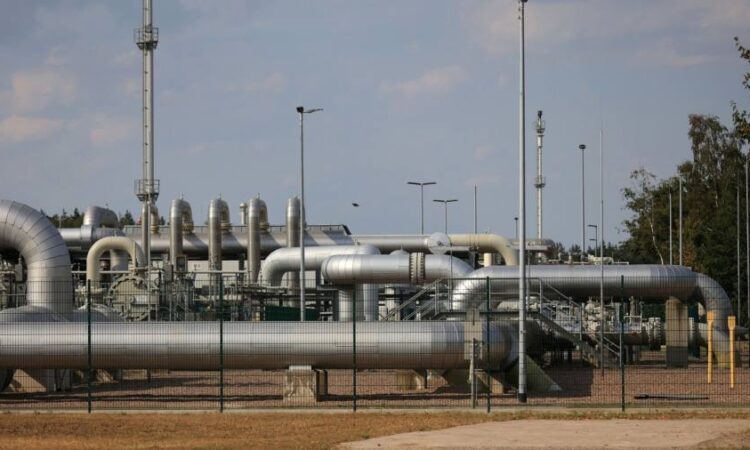
“Not even a recession.” That is the verdict on how Germany coped when it abruptly had to do without Russian energy supplies last year — a dependency that had been cultivated by all German governments of the past half-century, for both commercial and political reasons.
The phrase is the title of a new study by economists Benjamin Moll, Moritz Schularick and Georg Zachmann, who compare the outcome for the German economy with the predictions made immediately after Vladimir Putin’s full-scale assault on Ukraine. The invasion triggered what they call “the great German gas debate” between disagreeing groups of economists, with business lobbies and unions weighing in about whether the economic cost of ending Russian gas imports would be bearable.
As Moll and his colleagues remind us, some of these predictions were apocalyptic: up to 12 per cent loss of economic output and millions losing their jobs. Those arguing the losses would be much smaller were berated by chancellor Olaf Scholz himself for “irresponsible” theorising.
Politically, the debate was won by the doom-mongers. The impressive speed with which Berlin found substitute sources of gas and built emergency infrastructure makes it easy to forget that Germany did not in fact choose to go without Russian gas. That was a decision Putin made for it by throttling gas supplies before stopping them altogether late last summer. And the EU as a whole took too long to agree its still-incomplete restrictions on Russian energy imports.
But the truth was on the optimists’ side. (I had a dog in this fight: I argued a week into the war that Europe could and should go “cold turkey” on Russian gas imports.) As Moll and his colleagues make clear, Germany’s growth outcome has been as good as the rosiest estimates of the energy war’s toll. There was no “cascade” of production cuts, bankruptcies and lay-offs from the most energy-intensive industries to the wider economy. Despite a drop in March, manufacturing output remains greater than a year earlier.
The authors even find that, according to German meteorological data, temperatures were no higher than the multiyear trend: if so, the idea that Germany was saved by a warm winter seems to be a myth. The gas left in storage by the end of the heating season means Germany never needed the Russian gas it bought before Putin closed the taps. Cold turkey would have been perfectly feasible.
The resilience of Germany’s economy is something to celebrate. More important is to learn the right lesson. Why did the balance of opinion wrongly oppose a morally and geostrategically right policy for being prohibitively expensive?
The inexcusable answer is a desire by some in corporate Germany not to have to face any economic cost at all for standing up to Putin. The more understandable, if disappointing, answer involves intellectual mistakes. There is a general lack of appreciation in continental Europe — for this goes beyond Germany — of how adaptable market economies are. It is reinforced by mistaking challenges to existing businesses for threats to the overall economy, when in fact the creative destruction of unadaptive companies is what makes market economies grow. In addition, European leaders have long internalised an outdated criticism of the European economy as particularly inflexible and “sclerotic”.
Germany’s great gas debate is only the most egregious example of how Europeans underrate their own economic adaptability. There are others. Few expected that the post-pandemic recovery would take employment rates to record highs — in stark contrast to the lagging US and UK labour markets. The EU’s taboo-breaking recovery fund is fuelling growth in countries many had written off as perennial basket cases.
If we don’t draw the right lessons from such examples, we will persist in an overly timid understanding of what Europe’s economies can deliver. The policy risks from such misdiagnosis are all around us, reinforced by the self-pleading of corporate incumbents.
Brussels has been forced to slow down the pace of its decarbonisation policies. Germany and France have both mounted rearguard actions against important legislation. French President Emmanuel Macron has demanded a “regulatory break”. German carmakers want to delay the EU-UK trade deal’s penalisation of electric cars with batteries made outside Europe.
In all these examples, the argument is that too much change is too difficult. But as the German gas debate shows, an economy is more flexible than the sum of its parts. If some companies are unwilling to change, dynamic markets make space for those that are willing and able to adapt. European economic policy should reinforce these market pressures, not protect against them.






